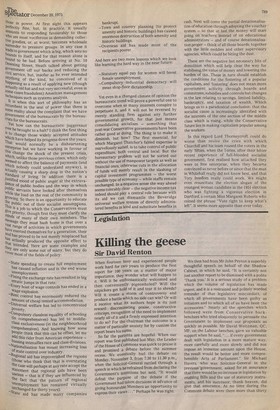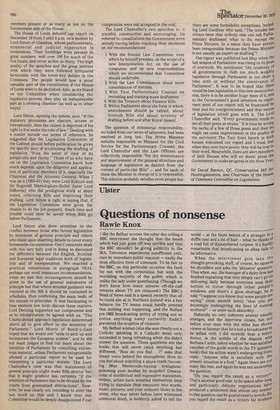Legislation
Killing the geese
Sir David Renton
When fourteen busy and experienced people work hard for two years to produce the first report for 100 years on a matter of major importance, they wonder what will happen to it Will it be enthusiastically welcomed and • then conveniently pigeonholed? Will the nitpickers get hold of it and tear it to shreds? Will it create a storm of controversy and produce a battle which no side can win? Or will it receive what its authors hope is its just reward:. discriminating praise, constructive criticism, recognition of the need to implement nearly all of it and a firmly expressed intention to do so? For the chairman the outcome is a matter of particular anxiety for by custom the report bears his name.
So far the portents are hopeful. When our report was first published last May, the Leader of the House of Commons was quick to praise it and promised a debate before the summer recess. We eventually had the debate on Monday, November 3, from 7.30 to 11.30 p.m„ when the Solicitor-General rattled through a speech in which he refrained from declaring the Government's intentions but said, "It would defeat the purpose of the debate if the Government had taken decisions in advance of. giving honourable Members an opportunity to express their views..." Perhaps he was right.
We then had from Mr John Peyton a superbly thoughtful speech on behalf of the Shadow Cabinet, in which he said, "It is certainly not just another report to be dismissed with a polite 'Thank you.' It is a serious study of a problem which the volume of legislation has made urgent, and it is a restrained and politely worded reminder of that legislative misconduct, of which all governments have been guilty as initiators and to which all of us have, been the accessories." Nearly all the speeches which followed were from Conservative backbenchers who tried eloquently to persuade the Government to implement our proposals as quickly as possible. Mr David Weitzman, QC, MP, on the Labour benches, gave us valuable support when he said, "... if every government dealt with legislation in a more mature way, more carefully and more slowly and did not impose an immense amount upon the House, the result would be better and more comprehensible Acts of Parliament." Sir Michael Havers, who was Solicitor-General in the previous government, asked for an assurance that there would be no increase in legislation by enabling Bills and the use of statutory instruments, and his successor, thank heaven, did give that assurance. At no time during the Commons debate were there more than thirty members present or as many as ten on the Government side of the House.
The House of Lords debated our report on December 10 from 3 until 8 p.m. on a motion by Lord Simon of Glaisdale, whose parliamentary, ministerial and judicial experience is tremendous. Their lordships were present in great numbers: well over 100 for much of the five hours, and never as few as thirty. The high quality of the speeches and the great interest with which they were followed compared favourably with the lower-key debate in the Commons. The people would lose a most valuable part of the constitution if the House of Lords were to be abolished. Also, as we found on our Committee when considering the legislative process, they play an indispensable part as a revising chamber (as well as in other ways).
Lord Simon, opening the debate, said, "11 the statutory provisions are obscure, arcane or hierophantic, then the citizen is deprived of his right to live under the rule of law." Dealing with a matter outside our terms of reference, he suggested that the Legislation Committee of the Cabinet should before publication be given the specific duty of scrutinising the drafting of legislation "from the point of view of its perspicuity and clarity." Those of us who have sat on the Legislation Committee know how much depends upon the diligence and application of particular members of it, especially the Chairman and the Attorney-General. When I was on it (1958-61) they were Lord Kilmuir and Sir Reginald Manningham-Buller (later Lord Dilhorne) who did prodigious work at short notice, criticising Bills and improving their drafting. Lord Simon is right in saying that, if the Legislation Committee were given the chance to do the job properly, much time and trouble could later be saved when Bills go before Parliament.
Lord Simon also drew attention to the conflict between those who favour legislation by statement of general principle and others who insist upon inserting details to cover every foreseeable circumstance. Our Committee dealt with this very fully and in doing so discussed the difference between the English, Scottish and European legal traditions both of legislation and of interpretation. We reached a practical compromise in paragraph 10.13, perhaps our most important recommendation, when we said that encouragement should be given to the use of general statements of principle but that where detailed guidance was required in the Bill it should be contained in schedules, thus confirming the main body of the statute to principles. It was fascinating to hear eminent law lords discuss these matters. Lord Denning supported our compromise and as to interpretation he agreed with us. "The Courts should approach legislation determined above all to give effect to the intention of Parliament." Lord Morris of Borth-y-Gest hoped that we would not "seek to pick up and incorporate the European system", and he did not want judges to find out more about the intention of Parliament by consulting extraneous material, unless Parliament exceptionally allowed a particular report to be used for interpreting a particular statute. The Lord Chancellor's view was that statements of general principle might make Bills shorter but that it might produce less certainty "if the intention of Parliament has to be divined by the courts from generalised abstractions". However, he was clearly not intending to utter the last word on this and I know that our Committee would be deeply disappointed if our compromise were not accepted in the end.
The Lord Chancellor's two speeches wi ,-e graceful, constructive and encouraging. He referred to consultations the Government were already having before reaching their decisions on our recommendations:
I. With the Statute Law Committee, over which he himself presides, on the scope of a new Interpretation Act, on the use of computers and on new responsibilities which we recommended that Committee should undertake.
2. With the Law Commissions 'about more consolidation of statutes.
3. With First Parliamentary Counsel on recruiting and training more draftsmen.
4. With the Treasury about Finance Bills.
5. Within Parliament about the form in which amendments should be tabled, about Scottish Bills and about scrutiny of drafting before and after Royal Assent.
The question of ministerial responsibility, excluded from our terms of reference, had been resolved at long last. The Prime Minister remains responsible as Minister for the Civil Service for the Parliamentary Counsel; the Lord Chancellor and the Law Officers are collectively responsible "for the maintenance and improvement of the general structure and language of legislation as distinct from the content of particular Bills" — and for each of these the Minister in charge of it is responsible. This solution probably satisfies most people but
there are some formidable exceptions, including Lord Gardiner who said, "The trouble has always been that nobody else can tell Parliamentary draftsmen what to do, except the Prime Minister. In a sense they have alwaYs been irresponsible because the Prime Minister is not usually an expert on drafting"! Our report was published last May when the last session of Parliament was rising to its peak of overwork. We mentioned "the tendency of all governments to rush too much weighty legislation through Parliament in too short a time with or without the connivance of Parliament". It was to be hoped that there would be less legislation in this new session but, alas, there is to be another huge mass of it, and so the Government's good intention to implement most of our report will be frustrated bY their zeal for overgovernment and that excess of legislation which goes with it. The Lord Chancellor said, "Every government tends to see all their geese as swans," It is time he wrung the necks of a few of those geese and then we might see some improvement in the quality o' the survivors! The Tory front bench in both houses welcomed our report and I trust that when they next have power they will be true to their word. Meanwhile, there are alert members of both Houses who will no doubt press the Government to make progress in the New year.
Sir David Renton, QC, Conservative MP for Huntingdonshire, was Chairman of the House of Commons Committee on Legislation.
■••••



































 Previous page
Previous page